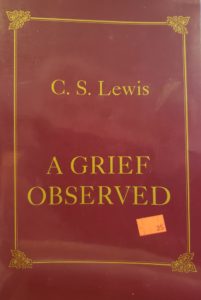
I have known about C.S. Lewis’ book A Grief Observed for a long time. In fact, it’s the second of his books that I bought. That was back in 1976. I had discovered Lewis the year before and read The Screwtape Letters, finding it very helpful to me in my then new Christian walk. When my grandfather died in 1976, I learned that he had written this book and bought a copy and sent it to my grandmother, even though I didn’t read it first. She and I never had a discussion about it, and I don’t know if she read it.
Somewhere along the line, I bought another copy of it, a used, large print edition. I’ve always had difficulty reading and enjoying large print books, and this one was the same. It sat on a shelf for a few years with my other Lewis books. I finally got around to reading it a couple of months ago.
A Grief Observed came from Lewis’ grief at the death of his wife, Joy (Davidman) Gresham Lewis. The story of Jack (as Lewis was called) and Joy is a long, complicated one, which I won’t go into now. After marrying Joy at her hospital bed, expecting her to die within days or weeks, she unexpectedly recovered and they had about three years together. When the cancer eventually took her life, Lewis went into a tailspin of sorts. As a means of mourning, he wrote down his thoughts. When his publisher learned of this, he (the publisher) suggested it ought to be published. And so it was in 1961 under the pseudonym N.W. Clerk.
This is the Lewis book I least enjoyed. I understand grief and how it affects a person. It was over forty years before I wrote about the grief I felt at my mother’s death. Each person must grieve in their own way; there is no right or wrong way. But this book is just…strange. It doesn’t seem coherent, unified. It truly is a collection of Lewis’ thoughts as he grieved. He questioned God. He questioned Christianity. He questioned himself. He rambled. The book doesn’t follow a linear path from first grief to later triumph. He wondered how he could go on. Yet, of course, he did go on, for three more years until his own death.
It seems that the purpose of a book is to: entertain, convey information, instruct, work for change, or a few other noble purposes. For me, this book did none of those. Since it’s a short book (72 pages in large print), it was a short read. I think I finished it in just three or four sittings. At the end of the read, I felt unfulfilled in regard to any of those noble purposes. Of course, I’m not in a grieving process right now. Perhaps if I were, I would have found the book helpful. I can’t imagine that my grandmother was helped if she read this.
I’m afraid I give it a mere 2-stars. If you’re grieving, perhaps you will find it helpful. If you want to read everything Lewis wrote, by all means read it. But otherwise, don’t worry about bypassing it.
The book is a keeper mainly to keep my C.S. Lewis collection intact. Otherwise, it would be out to the sale/donation shelves in the garage.